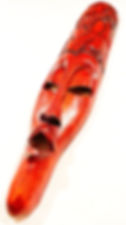Free Shipping on all Orders in the United States!
Subscribe to the newsletter for a chance to win a free painting!
Traditional African Wood Carvings
African Face Masks


Traditional African Facemasks are from the Sub-Saharan region of Africa, the region between the Sahara and the Kalahari desert. Even within this region however, cultural differences can be observed as one moves east to west and north to south across this region. Despite these distinct regions and cultures, many traits of the mask remain the same.
Traditional African Facemasks are used in a variety rituals and ceremonies. These include but are in no way limited to:
-
Communicating with the ancestors
-
Ensuring a successful harvest or season
-
Preparation or celebration of war and peace
-
Channeling the spirit on the mask, for instance, the strength of a Lion
-
Weddings, initiations, and funerals
The mask acts as a medium, allowing the wearer to shed their human identity and take on attributes of the totem on the mask. The creators of these masks are held in high esteem in the culture do to the significant role these masks play in traditional ceremonies. Historically these masks were often passed down from father to son as a part of their inheritance.
One of the reasons Facemasks are viewed as the quintessential form of African Art is its' influence on Western Art in the 20th Century. This is primarily seen in the artistic influences of Cubism, Fauvism, and Expressionism.
Unfortunately this new interest in Traditional African Masks came with a cost. During the later part of the 20th century, art collectors across primarily Europe descended on the continent of Africa with the intent of buying up every traditional mask that could be found. This lead to an almost complete depletion of Africa's supply of antique Facemasks. Recent pressure on this situation has begun to reverse this trend, but many masks of historical and cultural importance still reside in private collections outside of Africa.
The masks for sale below were carved by Deo in Kampala, Uganda. Historically, Uganda's culture rarely utilized facemasks as their artists often carved totems that resembled slender totem poles. Deo was drawn to wood carving early in life and began his career apprenticing for a group of artists who had moved east from The Congo, which has a long and deep history of carving ceremonial facemasks. It is from this artistic mentorship that Deo draws his inspiration for his own Traditional African Facemasks.

































































